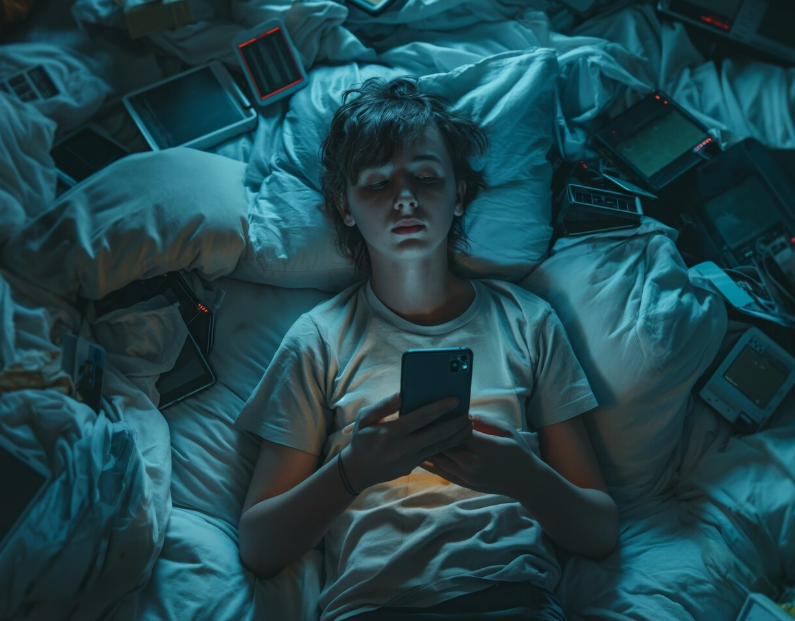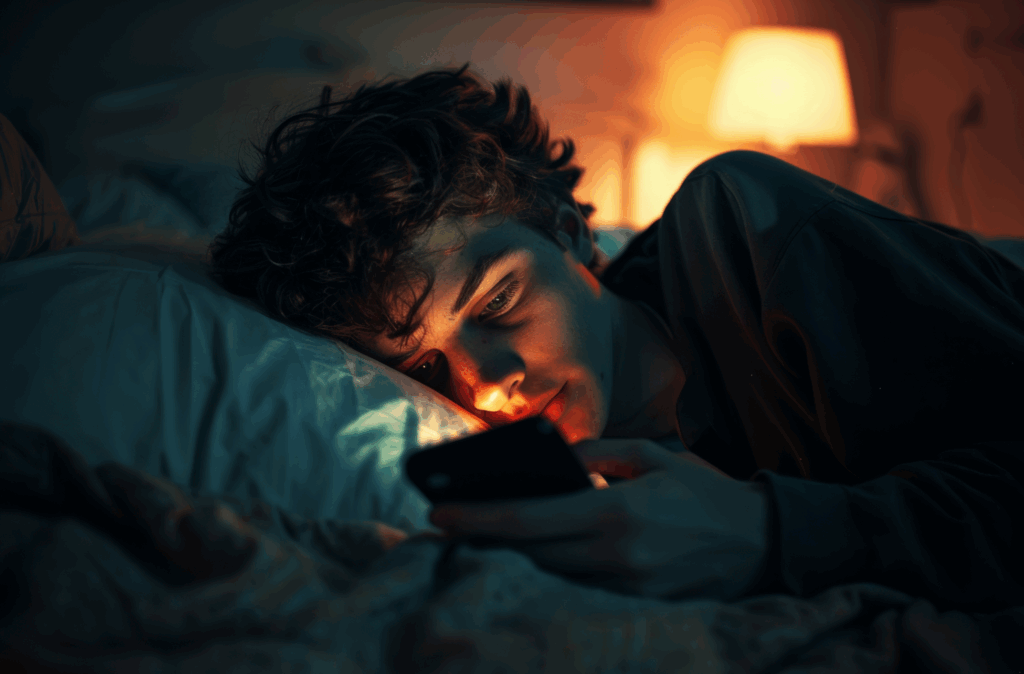We’ve all been there. It’s been a long day, you’re exhausted, yet somehow when your head hits the pillow, your mind decides it’s the perfect time to replay embarrassing moments from high school or plan your entire next vacation. If quality sleep feels like an elusive dream, you’re not alone. According to the American Sleep Association, 50-70 million US adults struggle with sleep disorders, and insomnia affects approximately 30% of the general population.
The good news? Sometimes the solution isn’t about adding more to your routine (like another supplement or sleep gadget), but rather about what you should stop doing right before bed. Those final 30 minutes before sleep are crucial for setting yourself up for restful slumber. Let’s explore five common pre-bedtime habits that might be sabotaging your sleep quality without you even realizing it.
1. Scrolling Through Your Phone (The Blue Light Special)
We’re all guilty of this one. You’re lying in bed, thinking you’ll just check one more email or scroll through social media for “just five minutes.” Fast forward, and suddenly it’s been an hour of mindless scrolling.
Beyond the time-sucking nature of our devices, the science behind why this habit is problematic is compelling. Our phones, tablets, and computer screens emit blue light, which signals to our brains that it’s still daytime. This suppresses the production of melatonin, the hormone responsible for regulating our sleep-wake cycle.
What happens physiologically: When you expose yourself to blue light before bed, your brain essentially gets confused about whether it should be winding down. Research from Harvard University found that this light exposure can delay the onset of REM sleep and reduce alertness the following morning.
Try instead: If you absolutely must use your device, enable night mode or blue light filters. Better yet, establish a digital curfew and switch to a physical book or journal for your final 30 minutes before sleep. Many people find that an old-fashioned paperback helps them drift off much more quickly than scrolling on social media.
2. Having “Just One More” Netflix Episode
“I’ll just watch one episode” has become the bedtime lie we all tell ourselves. Streaming services have mastered the art of keeping us engaged with auto-play features and cliffhanger endings.
Besides the obvious time extension of your waking hours, engaging with exciting, emotional, or suspenseful content activates your brain rather than relaxing it. Action scenes, plot twists, and dramatic moments trigger the release of stress hormones like cortisol and adrenaline—exactly what you don’t want coursing through your system at bedtime.
What happens physiologically: Your heart rate increases, your mind becomes alert and engaged, and your body moves further away from the relaxed state needed for sleep.
Try instead: If you enjoy having some entertainment before bed, consider switching to calming content like nature documentaries with soothing narration or gentle, non-plot-driven shows that won’t leave you hanging. Even better, establish a cutoff time for screens and transition to more sleep-friendly activities.
3. Chugging Water (Or Something Stronger)
Staying hydrated is important, but timing matters. Drinking large amounts of any liquid right before bed practically guarantees a middle-of-the-night bathroom trip, disrupting your sleep cycle.
As for nightcaps—despite alcohol’s reputation as a sleep inducer, that glass of wine before bed might be doing more harm than good. While alcohol can help you fall asleep initially, it disrupts the quality of your sleep, particularly during the second half of the night when it’s metabolized.
What happens physiologically: With excess water, your kidneys continue filtering while you sleep, filling your bladder and eventually triggering the urge to use the bathroom. With alcohol, you may fall asleep faster, but you’ll experience less restorative deep sleep and REM sleep, leading to fragmented rest.
Try instead: Taper off liquids 1-2 hours before bedtime. If you’re thirsty, take small sips rather than full glasses. For those who enjoy an evening drink, try moving your last alcoholic beverage to at least 3 hours before bedtime.
4. Having Heated Conversations or Checking Work Email
That text from your boss or an argument with your partner right before bed? It’s a recipe for lying awake with your mind racing. Engaging in emotionally charged conversations or work-related activities triggers stress responses and keeps your brain in problem-solving mode.
What happens physiologically: Your body releases cortisol and other stress hormones, which increase alertness and basically tell your body, “Now is not the time to sleep!” Your heart rate increases, muscles tense, and your digestive system even slows down as your body prepares for perceived “threats.”
Try instead: Set boundaries around work communications and establish a mental “shutdown” ritual. Difficult conversations or important work matters are almost always better addressed after a good night’s sleep anyway. If something is causing anxiety, try writing it down in a journal to symbolically put it aside until morning.
5. Snacking on the Wrong Foods
That late-night bowl of ice cream or bag of chips might satisfy a craving, but it could be setting you up for a night of tossing and turning. Heavy, fatty, or sugary foods consumed right before bed can cause indigestion and acid reflux when you lie down.
Spicy foods are another culprit, as they can raise your body temperature—the opposite of what should naturally happen as you prepare for sleep. Your core temperature needs to drop slightly to facilitate optimal sleep.
What happens physiologically: Your digestive system works hard to process that late-night snack, potentially causing discomfort. Sugar causes fluctuations in blood glucose levels that can wake you from sleep. Meanwhile, caffeine from chocolate or certain teas blocks adenosine receptors—the very receptors that help you feel sleepy.
Try instead: If you’re truly hungry before bed, opt for small portions of sleep-supporting foods. A small handful of nuts, a piece of fruit with a small amount of nut butter, or a small serving of cottage cheese provide nutrients that may actually support sleep without overloading your digestive system.
Creating Your Perfect Pre-Sleep Routine
Now that you know what to avoid, consider building a consistent pre-sleep routine that signals to your body and mind that it’s time to wind down. This might include:
- Gentle stretching or relaxation exercises
- Reading a physical book (nothing too exciting or suspenseful)
- Listening to calming music or a sleep meditation
- Taking a warm shower or bath (which helps trigger the natural drop in body temperature that signals sleep)
- Dimming the lights throughout your home to signal to your brain that darkness is coming
The key is consistency. When you repeat the same relaxing activities in the same order each night, your brain begins to associate these cues with sleep, making it easier to drift off when you finally do hit the pillow.
When to Seek Help
While improving your pre-bedtime habits can significantly impact sleep quality for many people, persistent insomnia may require additional support. If you’ve been struggling with sleep for more than a month despite making positive changes to your routine, consider speaking with a healthcare provider.
The Bottom Line
Quality sleep isn’t a luxury—it’s a necessity for mental and physical wellbeing. By being mindful of these five common pre-sleep pitfalls and creating a more supportive bedtime routine, you might find that better sleep was within reach all along.
Remember that building new habits takes time. Be patient with yourself as you work on creating a more sleep-friendly evening routine, and celebrate small improvements along the way.

Disclaimer: This article is for informational purposes only and is not intended to provide medical advice, diagnosis, or treatment. The content should not be used during a medical emergency or for the diagnosis or treatment of any medical condition. Please consult your healthcare provider before making any changes to your lifestyle, diet, or sleep regimen, particularly if you have existing health conditions or concerns. This article is not a substitute for professional medical advice, diagnosis, or treatment.



